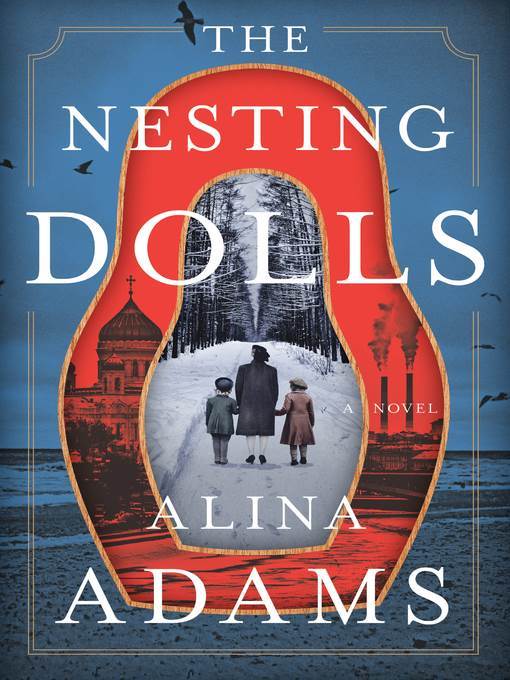
The Nesting Dolls
A Novel
کتاب های مرتبط
- اطلاعات
- نقد و بررسی
- دیدگاه کاربران
نقد و بررسی

May 15, 2020
Adams' mesmerizing historical novel follows the lives of three generations of Russian women, from the 1930s in the USSR to present-day New York. Composed of three parts, the saga opens in Odessa, where Daria marries renowned pianist Edward. Their lives are upended when they are condemned as enemies of the state and deported to a labor camp in Siberia. There Daria must make harrowing, heartbreaking decisions to save her family and herself. Years later in 1970s Odessa, Natasha, Daria's granddaughter, is unhappy with her teaching job and yearns to escape the confines of her daily life. She becomes infatuated with fiery Dima, who leads a resistance group, and is drawn into his world even though it could threaten her livelihood. Part three finds Zoe, Natasha's granddaughter, in Brighton Beach in 2019, where she navigates her personal life and career and tries to fully connect with her immigrant family. Adams' sweeping tale offers captivating explorations of her characters and their complexities, particularly when it comes to their struggles between the pull of the heart and the realities in which they live.(Reprinted with permission of Booklist, copyright 2020, American Library Association.)

May 25, 2020
Adams’s finely detailed historical romance (after the soap opera tie-in Oakdale Confidential) follows five generations of headstrong, passionate Jewish women. In 2019 in Brighton Beach, Brooklyn, Zoe is preparing her grandparents’ 45th anniversary party even though her grandmother Natasha doesn’t want one. In a series of flashbacks, Adams reveals why. In Odessa, Ukraine, during the 1930s, Zoe’s great-great grandmother Daria marries a brilliant concert pianist. They get by until their apartment building’s porter, Adam, a Stalinist informer, falsely alleges they were speaking German. In a strange twist of fate, Adam is jailed with them (“I was turned in for not turning you in”). In the 1970s, Daria’s mathematician granddaughter, Natasha, becomes the lover of Dmitri, a charismatic advocate for dissident Soviet Jews in Ukraine. Natasha helps Dmitri by copying and distributing banned books such as Solzhenitsyn’s The Gulag Archipelago. After Dmitri lands in prison, Natasha, pregnant with his child, immigrates to the U.S. with the help of her lifelong friend, Boris, whom she marries. Adams then returns to Zoe, who feels oppressed by her neighborhood’s gloom yet increasingly drawn to the lessons learned and imparted by her forebears. The author’s wry Soviet-Jewish humor enlivens the well-developed characters, who make fatal mistakes as well as selfless sacrifices. This is a satisfying, life-affirming saga.

July 1, 2020
The stories of five generations of Soviet Jewish women come to light as a Brighton Beach family prepares to celebrate an anniversary. In 1930s Odessa, Daria Gordon seems to have it all. Her new husband, a refined pianist who, to her mother's delight, hails from a social class slightly above her own, is smitten with her. But their fortunes quickly turn when they and their two daughters are deported as enemies of the state, allegedly having been overheard speaking German. As laborers in Siberia, they encounter extreme hardship, and Daria turns to an unexpected source for help, embarking on a relationship that will indelibly change the course of her family's life. At this point the narrative jumps to the 1970s and shifts to the perspective of Daria's granddaughter Natasha, a gifted math student in Odessa whose ambitions are thwarted by state anti-Semitism. Her desire to broaden the horizons of her world, mixed with her infatuation with a charismatic young refusenik, sets her on a path that propels the narrative forward again to the present-day Russian-speaking Brooklyn enclave of Brighton Beach, once more skipping two generations to the perspective of Natasha's granddaughter Zoe, who is dealing with her own romantic entanglements. The novel's title, though perhaps unoriginal, is appropriate: With each section, Adams reveals another layer of the matryoshka doll that is Zoe's history and identity. As the family prepares to celebrate Natasha and her husband's 45th wedding anniversary, about which Natasha is strangely unenthusiastic, Zoe comes to understand how her foremothers' choices have brought her family to the present moment. Adams' prose leaves much to be desired; she often relies too heavily on melodramatic clich�s instead of letting the already soap-opera-esque dynamism of her story speak for itself. But ultimately, the novel adds a degree of nuance to a historical narrative that is often flattened: It depicts some of the subtleties and complexities of being a Jew in the Soviet Union, offering a partial corrective to the frequent oversimplification of a chapter of history that is anything but simple. Moreover, it is a compelling example of how deeply personal stories can lie beneath the surface of sweeping histories. An imperfect but ambitious family saga that invites us to consider the personal and emotional stakes of political choices.
COPYRIGHT(2020) Kirkus Reviews, ALL RIGHTS RESERVED.

























دیدگاه کاربران